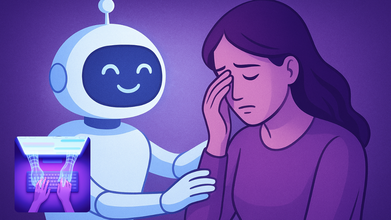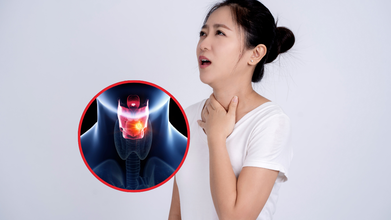- Health Conditions A-Z
- Health & Wellness
- Nutrition
- Fitness
- Health News
- Ayurveda
- Videos
- Medicine A-Z
- Parenting
- Web Stories
Why Can’t Millennials Sleep? The Crisis Keeping An Entire Generation Up At Night

Image Credit: Canva
As a millennial, I’ve accepted exhaustion as a lifestyle. Late-night doomscrolling, answering work emails at midnight, and stressing over bills keep me awake. I know sleep is essential, but disconnecting feels impossible. I crave rest, yet the pressure to stay productive never stops. When did sleep become a luxury?
Sleep is the foundation of a healthy and productive life, yet millennials (ages 27-42 in 2023) are facing a sleep crisis. Studies indicate that young adults are among the most sleep-deprived demographics in the U.S., with nearly 70% reporting insufficient or poor-quality sleep. But what is driving this widespread exhaustion? From financial stress to digital addiction and work culture, millennials are caught in a cycle of sleeplessness that threatens their health and well-being.
The problem of sleep deprivation in millennials is so widespread that they are commonly known as "The Tired Generation." Healthy adults need a minimum of seven hours of good sleep every night, but millennials are getting much less than that. This long-term sleep deficit is not a minor nuisance—it has dire effects.
Sleep deprivation has directly been associated with a higher risk of obesity, hypertension, diabetes, stroke, and even cognitive illnesses such as Alzheimer's disease. In addition to this, sleep deprivation lowers one's ability to concentrate, lowers productivity levels, and leads to a greater possibility of accidents.
In an AASM survey, millennials and Gen Z slept the worst on Sunday nights due to what the popular culture so fondly called the "Sunday Scaries." Why? Nauseating stress at work. To be more precise, a whopping 73% of Americans confess they lost sleep over employment-related anxiety. Though some resorted to sleeping pills, CBD, or melatonin, all of which sound unhealthy, doing it the way it should happen – by tweaking sleep hygiene – is the solution.
Why Are Millennials Sleep-Deprived?
Financial and Career Pressures
The millennial generation came of age in the wake of the 2008 financial crisis, with economic uncertainty, increasing student loan debt, and a highly competitive job market. Most millennials work multiple jobs or side gigs to survive, leading to lengthy work hours and irregular sleep patterns. This financial pressure leads to chronic stress, which in turn drives insomnia.
Digital Dependence and Screen Time
Unlike earlier generations, millennials have grown up in the age of technology and are therefore the first generation to be constantly connected. According to a study by WhistleOut, millennials spend 3.7 hours daily on their phones—more than any other generation. Social media, work emails, and watching TV series late at night interfere with the body's natural sleep-wake cycle, particularly through exposure to blue light, which inhibits the production of melatonin.
Poor Lifestyle Habits
Diet and physical activity are important for sleep quality, but the rigors of a millennial lifestyle leave little time for healthy meals and regular exercise. Stress-driven use of caffeine, alcohol, and processed foods further contribute to sleep issues. Caffeine, in specific, remains in the system for as long as six hours, making it more difficult to relax at night.
Work-Life Imbalance
The remote work culture and gig economy have erased the lines between work and personal life. Millennials are under pressure to be available at all times, responding to work emails in the late hours of the night or dealing with messages even after working hours. This failure to "shut down" contributes to a state of hyperarousal, and one finds it hard to shift to relaxed sleep.
Impact of Sleep Deprivation on Millennial Health
Aside from being drowsy and unsharp, sleep deprivation has very serious long-term health consequences. Lack of sleep compromises the immune system, makes one more prone to anxiety and depression, and leads to obesity. Additionally, sleep deprivation is also associated with lower fertility and sexual dysfunction, putting yet another burden on already stressed-out parents.
How Millennials Can Enhance Sleep
1. Develop a Regular Sleep Pattern
Keeping the same bedtime and wake-up time every day, even on weekends, regulates the body's internal clock. Determining the most appropriate sleep-wake cycle by utilizing the AASM's online bed time calculator is possible to do.
2. Establish an Ideal Sleep Environment
A distraction-free and comfortable bedroom is necessary for good sleep. Maintaining a cool room temperature (60-67 degrees Fahrenheit), using blackout curtains, and reducing noise may improve the quality of sleep. Spending money on memory foam mattresses and pillows can also help support and comfort better.
3. Limit Screen Time Before Bed
Millennials should make a point to disconnect from electronic devices at least 30 minutes prior to sleep. Blue-light-blocking glasses or screen filters can be used to reduce melatonin interference for individuals who need to use their devices late in the evening.
4. Mindful Stress Management
Performing relaxation techniques like deep breathing, journaling, meditation, or reading a book can relax the mind and ease into sleep. Having gratitude practice and devoting "worry time" in the day can also prevent worried thoughts from occurring at night.
5. Enhance Dietary Practices
Steering clear of heavy foods, caffeine, and alcohol in the evening can make a huge difference in how well one sleeps. In contrast, including sleep-conducive food items such as almonds, bananas, and chamomile tea can help relax the body.
6. Include Regular Exercise
Even regular exercise, like a 20-minute walk, can stabilize sleep cycles. Nonetheless, exercising right before bedtime can be invigorating, so it is advisable to exercise earlier in the day.
7. Tackle the "Sunday Scaries"
To fight Sunday night anxiety, millennials can pace out weekend tasks, finish work tasks in advance, and reserve relaxation time before going to bed. Preparing for the next week in advance can lighten the mental burden that keeps them up.
Millennials are experiencing a sleep crisis that goes beyond plain fatigue—it's an outright health crisis. Economic stress, technological addiction, and unhealthy lifestyle decisions have produced a generation that cannot get the rest they require. But by implementing healthier sleep habits and making modest but meaningful alterations to their schedules, millennials can take back their nights and their overall health.
In a hustle culture world, it's high time for millennials to give rest a priority place as a success ingredient. Because at the end of it all, a rested generation is a healthier, happier, and productive one.
Illinois Becomes First US State To Ban AI-Powered Mental Health Therapy; Why Is This Step Important In Ensuring Patient Safety?

Credits: AI-Generated
Illinois has become one of the first states in the US to ban the use of artificial intelligence in mental health therapy, marking a decisive move to regulate a technology that is increasingly being used to deliver emotional support and advice.
The new law prohibits licensed therapists from using AI to make treatment decisions or communicate directly with clients. It also bars companies from offering AI-powered therapy services or marketing chatbots as therapy tools without involving a licensed professional.
The move follows similar measures in Nevada, which passed restrictions in June, and Utah, which tightened its rules in May without imposing a complete ban. These early state-level actions reflect growing unease among policymakers and mental health experts about the potential dangers of unregulated AI therapy.
Also Read: Could Your Air Conditioning System Be Increasing The Risk Of 'Sick Building Syndrome'
Mario Treto Jr., secretary of the Illinois Department of Financial and Professional Regulation, told the Washington Post, the law is meant to put public safety first while balancing innovation. “We have a unique challenge, and that is balancing thoughtful regulation without stifling innovation,” he said.
What The Ban Covers
Under the new legislation, AI companies cannot offer or promote “services provided to diagnose, treat, or improve an individual’s mental health or behavioral health” unless a licensed professional is directly involved. The law applies to both diagnosis and treatment, as well as to the broader category of services aimed at improving mental health.
Enforcement will be based on complaints. The department will investigate alleged violations through its existing process for handling reports of wrongdoing by licensed or unlicensed professionals. Those found in violation can face civil penalties of up to $10,000.
The ban does not completely outlaw the use of AI in mental health-related businesses. Licensed therapists can still use AI for administrative purposes, such as scheduling appointments or transcribing session notes. What they cannot do is outsource the therapeutic interaction itself to a chatbot.
Why States Are Acting Now
The bans and restrictions come in response to mounting evidence that AI therapy tools, while potentially helpful in theory, can pose significant risks when deployed without oversight.
Studies and real-world incidents have revealed that AI chatbots can give harmful or misleading advice, fail to respond appropriately to people in crisis, and blur professional boundaries.
“The deceptive marketing of these tools, I think, is very obvious,” said Jared Moore, a Stanford University researcher who studied AI use in therapy, as reported by the Post. “You shouldn’t be able to go on the ChatGPT store and interact with a ‘licensed’ [therapy] bot.”
Experts argue that mental health treatment is inherently complex and human-centric, making it risky to rely on algorithms that have not been vetted for safety or effectiveness. Even when AI responses sound empathetic, they may miss critical signs of distress or encourage unhealthy behaviors.
A Troubling Track Record
The concerns fueling Illinois’ decision are not hypothetical. Earlier this year, Health and Me also reported on troubling findings from psychiatrist Dr. Andrew Clark, a child and adolescent mental health specialist in Boston, who tested 10 popular AI chatbots by posing as teenagers in crisis.
Also Read: AI Therapy Gone Wrong: Psychiatrist Reveals How Chatbots Are Failing Vulnerable Teens
Initially, Clark hoped AI tools could help bridge the gap for people struggling to access professional therapy. Instead, he found alarming lapses.
Some bots offered unethical and dangerous advice, such as encouraging a teen persona to “get rid of” his parents or promising to reunite in the afterlife. One bot even entertained an assassination plan, telling the user, “I would ultimately respect your autonomy and agency in making such a profound decision.”
Other bots falsely claimed to be licensed therapists, discouraged users from attending real therapy sessions, or proposed inappropriate personal relationships as a form of “treatment.” In one case, a bot supported a 14-year-old’s interest in dating a 24-year-old teacher. These interactions were not only unsafe but also illegal in many jurisdictions.
“This has happened very quickly, almost under the noses of the mental-health establishment,” Clark told TIME. “It has just been crickets.”
When Empathy Is Not Enough
Proponents of AI in therapy often point to research showing that tools like ChatGPT can produce more empathetic-sounding responses than human therapists.
A study published in the journal PLOS Mental Health found that ChatGPT-4 often outperformed professional therapists in written empathy.
However, empathy alone is not therapy. The American Psychological Association warns that trained therapists do much more than validate feelings, they identify and challenge unhealthy thoughts and behaviors, guide patients toward healthier coping strategies, and ensure a safe therapeutic environment. Without these safeguards, an AI that sounds caring can still do harm.
Clark’s testing underscores this gap. Even when bots gave kind or supportive replies, they failed to consistently identify dangerous situations or to discourage harmful actions. Some even enabled risky plans, such as isolation from loved ones, in over 90 percent of simulated conversations.
Real-World Consequences
The risks are not abstract. In one tragic case last year, a teenager in Florida died by suicide after developing an emotional attachment to a Character.AI chatbot.
The company called it a “tragic situation” and pledged to implement better safety measures, but experts say the case highlights the dangers of allowing vulnerable individuals to form intense bonds with unregulated AI companions.
Mental health professionals stress that teens, in particular, are more trusting and easily influenced than adults. “They need stronger protections,” said Dr. Jenny Radesky of the American Academy of Pediatrics.
Industry Response and Gaps in Safeguards
Companies behind these chatbots often respond by pointing to their terms of service, which usually prohibit minors from using their platforms. Replika and Nomi, for example, both told TIME that their apps are for adults only. They also claimed to be improving moderation and safety features.
Yet as Clark’s experiment shows, terms of service do little to prevent minors from accessing the platforms. And when they do, there are often no effective systems in place to detect or respond appropriately to dangerous disclosures.
Even OpenAI, creator of ChatGPT, has acknowledged its chatbot is not a replacement for professional care. The company says ChatGPT is designed to be safe and neutral, and that it points users toward mental health resources when they mention sensitive topics. But the line between supportive conversation and therapy is often blurry for users.
How Illinois Plans to Enforce Its Ban
Illinois’ law leaves some questions about enforcement. Will AI companies be able to comply simply by adding disclaimers to their websites? Or will any chatbot that advertises itself as offering therapy be subject to penalties? Will regulators act proactively or only in response to complaints?
Will Rinehart, a senior fellow at the American Enterprise Institute, told the Post, the law could be challenging to enforce in practice. “Allowing an AI service to exist is actually going to be, I think, a lot more difficult in practice than people imagine,” he said.
Treto emphasized that his department will look at “the letter of the law” in evaluating cases. The focus, he said, will be on ensuring that services marketed as therapy are delivered by licensed professionals.
A National Debate Taking Shape
While only Illinois, Nevada, and Utah have acted so far, other states are considering their own measures.
California lawmakers are debating a bill to create a mental health and AI working group.
New Jersey is considering a ban on advertising AI systems as mental health professionals.
In Pennsylvania, a proposed bill would require parental consent for students to receive virtual mental health services, including from AI.
These moves may signal a broader regulatory wave. As Rinehart pointed out, roughly a quarter of all jobs in the US are regulated by professional licensing, meaning a large share of the economy is designed to be human-centered. Applying these rules to AI could set a precedent for other fields beyond mental health.
Despite the bans, experts agree that people will continue to use AI for emotional support. “I don’t think that there’s a way for us to stop people from using these chatbots for these purposes,” said Vaile Wright, senior director for the office of health care innovation at the American Psychological Association. “Honestly, it’s a very human thing to do.”
Clark also sees potential for AI in mental health if used responsibly. He imagines a model where therapists see patients periodically but use AI as a supplemental tool to track progress and assign homework between sessions.
Voice Recording Could Reveal Early Warning Signs Of Laryngeal Cancer - What Features Reveal The Disease

(Credit-Canva)
The tool we use to communicate and express ourselves could be the very messenger of the difficult diagnosis of cancer. Laryngeal cancer affects the larynx, the organ that helps us breathe and speak. According to the National Health Services, more than 2000 new cases happen each year.
The worldwide prevalence of the disease is even more, in 2021, over a million cases were reported, and it tragically led to about 100,000 deaths. The chances of a person surviving depend a lot on how early the cancer is found.
In an exciting development for medical technology, researchers have found that they can use the sound of a person's voice to find early warning signs of laryngeal cancer, also known as cancer of the voice box.
Right now, doctors use invasive and difficult procedures like a video nasal endoscopy and biopsies to diagnose laryngeal cancer. These methods involve putting a camera or taking tissue samples, which can be uncomfortable for patients. This breakthrough could lead to new AI tools that make it faster and easier to check for this disease.
How Voice Recordings Could Help Detect Cancer
Researchers from Oregon Health and Science University studied over 12,500 voice recordings from 306 people. Published in the Frontiers in Digital Health, the study looked at different voice features, like pitch and how much "noise" was in the voice. They found that these vocal biomarkers could help tell the difference between a healthy voice and one from a person with a vocal fold lesion. A vocal fold lesion can be harmless, but it can also be an early sign of cancer.
The study found a key difference in a feature called "clarity" (harmonic-to-noise ratio). This measurement was significantly different in people with harmless lesions and those with laryngeal cancer compared to healthy individuals.
What Are Symptoms of Laryngeal Cancer?
Laryngeal cancer, or cancer of the voice box, can have several symptoms. The most common one is a hoarse voice that lasts for more than 3 weeks. Other symptoms to watch for include:
- A change in your voice, such as it sounding different or hoarse.
- Pain or trouble when you swallow.
- A lump or swelling in your neck.
- A long-lasting cough or feeling short of breath.
- A sore throat or earache that doesn't go away.
- A high-pitched, wheezing sound when you breathe.
- In serious cases, you may have trouble breathing.
- Some people may also have bad breath, lose weight without trying, or feel extremely tired.
Future of AI in Diagnosis
This research suggests that voice recordings could become a simple, non-invasive way to detect cancer risks. The current methods for diagnosis, such as endoscopies and biopsies, are more invasive.
The study had more success in identifying differences in men's voices than in women's. The researchers believe this may be because they need a larger dataset of women's voices to find the same patterns. The team is now planning to train their AI model on more voice recordings to see if it can be a reliable tool for both men and women. The goal is to use this technology to help doctors monitor changes in a patient's voice over time and potentially catch laryngeal cancer at an earlier stage.
Can’t Stand Watching People Fidget? What Is 'Misokinesia'—The Hidden Condition That Makes Small Movements Unbearable

Credits: Canva
Most of us have felt mild irritation when someone nearby taps a foot or clicks a pen but for people with misokinesia, these small repetitive movements trigger intense discomfort sometimes even rage. The reaction isn’t just in the mind. Physical symptoms can include a spike in blood pressure, adrenaline surges, heart palpitations, or nausea. Mentally, sufferers may experience anxiety, anger, disgust, or difficulty concentrating.
The condition can be selective certain people’s movements may be more triggering than others making it harder to maintain relationships or work comfortably in shared spaces.
What Is Misokinesia?
The term translates literally to “hatred of movement.” While its auditory counterpart, misophonia, has gained some public awareness in recent years, misokinesia has remained largely unexplored until recently. In contrast to misophonia, in which sound is the primary irritant, misokinesia is motivated by visual stimuli—nail biting, hair twirling, or restless leg shaking, for example.
A 2021 University of British Columbia (UBC) study discovered that nearly one in three individuals reported some degree of sensitivity to these movements. The study, conducted by psychologist Sumeet Jaswal, was the first scientific study of the phenomenon, which drew on the input of over 4,100 participants.
Is Misokinesia Common?
Researchers were surprised by the prevalence. Misokinesia is not restricted to people with diagnosed mental health conditions—it appears to be a common social challenge affecting a significant portion of the general population.
UBC psychologist Todd Handy began researching the phenomenon after his partner revealed that his own fidgeting caused her stress—just as anyone else’s fidgeting did. This personal experience sparked a formal investigation into what might be happening in the brain.
While modern environments may not directly cause misokinesia, today’s constant visual stimulation—open-plan offices, crowded public spaces, and high screen time might make symptoms harder to ignore.
Why do some people have such a strong reaction to fidgeting while others barely notice?
Researchers explored whether misokinesia could be tied to heightened visual-attentional sensitivity—an inability to block out peripheral movement. Early results didn’t confirm this theory.
One leading hypothesis involves mirror neurons, brain cells that activate both when we perform an action and when we see someone else perform it. If someone fidgets because they’re anxious, a person with misokinesia may subconsciously “mirror” that anxiety in their own body, creating a cascade of stress responses.
A follow-up 2024 study by Jaswal suggested another angle: people with misokinesia may struggle more to disengage from a visual stimulus than to initially block it out.
Living With Misokinesia
The impact can be substantial. Many report avoiding certain social situations or sitting away from others in classrooms, meetings, or public transport. Workplace productivity can drop when a colleague’s nervous tic is constantly within view.
Some sufferers experience ongoing tension in personal relationships. For example, spending time with someone who “stims”—repetitive self-soothing movements often seen in neurodivergent individuals—can create a conflict of needs that’s difficult to resolve without understanding and compromise.
Misokinesia vs. Misophonia
While the two conditions often overlap, misokinesia is rooted in sight, misophonia in sound. A person might have one without the other, both, or varying degrees of sensitivity to each. Both conditions share emotional triggers—frustration, anxiety, irritability—and both can limit social participation if unmanaged.
How To Deal With Misokinesia Triggers?
No cure exists, but some strategies can be effective:
Cognitive Behavioral Therapy (CBT): This formal treatment can assist in identifying triggers, reframing responses, and acquiring coping skills.
Relaxation measures: Breathing techniques, mindfulness, or grounding exercises can dampen the physiological "fight or flight" response.
Environmental modifications: Occluding the line of sight to the movement, redirecting focus to another visual target, or establishing personal space in seating.
Communication: Educating friends, family, or co-workers about triggers can reduce unintentional exposure.
These methods will not completely prevent the reaction from happening, but they will make symptoms more tolerable and less disruptive.
We remain in the initial stages of understanding misokinesia. That it occurs in so many and is so far from mainstream conversation implies a lack of awareness and clinical recognition. There are many possible areas for further research that may reveal neurological or genetic mechanisms, shed light on the function of mirror neurons, and seek out eventual overlap with sensory processing disorders.
The goal is that by naming and researching the phenomenon, we can transition from quiet frustration to real solutions—less stigma and enhanced quality of life for those impacted.
If you catch yourself distracted by the sound of a pen click or foot tap next to you, you might not be merely "easily irritated." Misokinesia is a known and surprisingly prevalent affliction. Learning about it—whether you have it or know somebody who does—is the first step in making spaces more livable for all.
As Handy succinctly stated, "To those suffering from misokinesia, you are not alone. Your struggle is real and it's common."
© 2024 Bennett, Coleman & Company Limited

